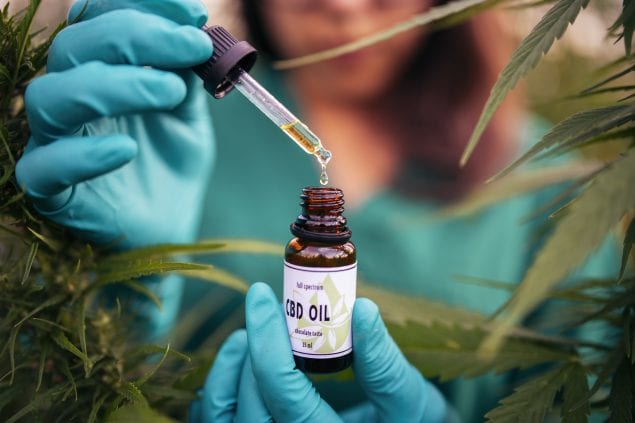CBD: What You Need to Know

Cannabidiol (CBD) is a compound found in marijuana. CBD is not impairing, meaning it does not cause a “high.”1
CBD can be derived from hemp or from non-hemp plants. Hemp is defined as any part of the cannabis sativa plant with no more than 0.3% of tetrahydrocannabinol (THC), the mind-altering substance in marijuana.
CBD Use in the United States
In 2018, the U.S. Congress passed and signed into law the Agriculture Improvement Act. This law removed hemp from the federal Controlled Substances Act, effectively legalizing CBD if it comes from hemp.2 However, a few states have not removed hemp from their state’s controlled substances acts, so legality of CBD products differs across states.
CBD is marketed in many consumer products:
- Foods
- Oils
- Lotions
- Capsules
- Cosmetics
How Can CBD Affect Your Health?
Is CBD a medicine?
Scientists are still learning about how CBD affects the body. The U.S. Food and Drug Administration (FDA) approved Epidiolex, a medicine that contains purified CBD from hemp, to help treat rare seizure disorders. The FDA has concluded that this drug is safe and effective for this intended use. However, other marketed products and uses of CBD may not be FDA approved.
Potential harms and side effects
Using CBD products is not risk free. The FDA has limited data on CBD safety. Please consider these possible side effects and risks before using CBD:3
- Liver damage
- Interference with other drugs you are taking, which may lead to injury or serious side effects
- Drowsiness or sleepiness
- Diarrhea or changes in appetite
- Changes in mood, such as irritability
Using CBD during pregnancy is not recommended.
CBD use during pregnancy is not recommended. The potential health effects of using CBD products during pregnancy are currently unknown. In animals, high doses of CBD have caused negative effects on developing fetuses.4
We do not know if CBD is passed to a baby through breast milk. Since negative effects have been associated with CBD use, people who are breastfeeding are encouraged to avoid CBD.
We do not know the effects of CBD on children’s developing brains. If you use products that contain CBD or THC, keep them in childproof containers and out of the reach of children.
For additional questions, contact your healthcare provider, your health department, or your local or regional poison control center at 1-800-222-1222, or 911 if it’s an emergency.
Unknowns
There is a lot we do not know about CBD. Currently, we do not know how CBD use affects a person over time. We also do not know how different modes of CBD use (smoking, vaping, eating, applying to skin, etc.) affect a person.
Risk of Unintentional Poisoning
Many businesses that sell hemp and CBD products also sell products that contain THC. Individuals should be careful to not mistake THC products for hemp or CBD products. Products containing THC can result in psychoactive effects and adverse events. Additionally, most CBD products are not regulated by the FDA. As such, consumers should be aware that products labeled as hemp or CBD may contain other ingredients, such as THC, pesticides, heavy metals, bacteria, or fungi.5
CDC released a Health Alert Network (HAN) Health Advisory in 2021 to inform consumers that CBD can be synthetically converted into Delta-8 THC, which is psychoactive and not well understood. This alert warns consumers about the potential for adverse events due to insufficient labeling of products containing THC and CBD.
If consumers experience adverse effects of THC- or CBD-containing products that are an immediate danger to their health, they should call their local or regional poison control center at 1-800-222-1222 or 911 or seek medical attention at their local emergency room and report the ingredients of products they have consumed to healthcare providers.
Learn more about CBD and Cannabis
- Marijuana and Public Health
- What We Know About Marijuana
- Marijuana Use Disorder
- Frequently Asked Questions
- What CDC is Doing
- What You Should Know About Using Cannabis, Including CBD, When Pregnant or Breastfeeding | FDA
- State Medical Cannabis Laws (ncsl.org) | National Conference of State Legislatures
- CDC Health Network Alert (HAN) Advisory: Increases in Availability of Cannabis Products Containing Delta-8 THC and Reported Cases of Adverse Events
- What You Need to Know (And What We’re Working to Find Out) About Products Containing Cannabis or Cannabis-derived Compounds, Including CBD | FDA
References
- National Academies of Sciences, Engineering, and Medicine. The health effects of cannabis and cannabinoids: the current state of evidence and recommendations for research. Washington, DC: The National Academies Press; 2017.
- Agriculture Improvement Act of 2018. H.R.2, 115th Cong. 2017-2018.
- Federal Drug Administration. What You Need to Know (And What We’re Working to Find Out) About Products Containing Cannabis or Cannabis-derived Compounds, Including CBD. Consumer Updates. 2020.
- Huestis MA, Solimini R, Pichini S, Pacifici R, Carlier J, Busardò FP. Cannabidiol Adverse Effects and Toxicity. Curr Neuropharmacol. 2019;17(10):974-989.
- Federal Drug Administration. What You Should Know About Using Cannabis, Including CBD, When Pregnant or Breastfeeding. 2019.